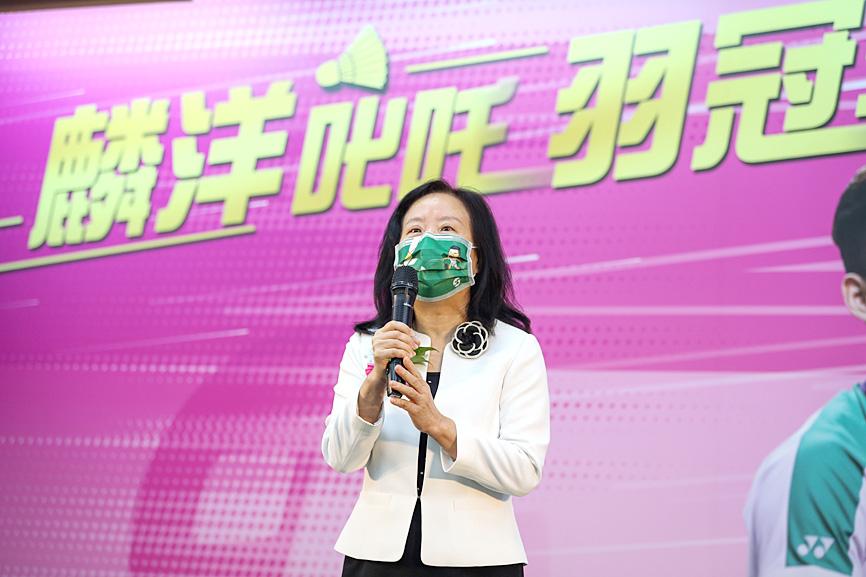State-owned Land Bank of Taiwan (土地銀行) is not looking to grow its mortgage and land financing next year to support the government’s bid to cool the property market, chairwoman Hsieh Chuan-chuan (謝娟娟) told a meeting of the legislature’s Finance Committee in Taipei yesterday.
Hsieh said that the nation’s largest mortgage and land loans provider has to keep doing business, but it would not be looking to increase its real-estate lending next year.
Analysts and academics have urged the central bank to introduce fresh credit controls at its quarterly board meeting on Thursday after previous measures have failed to curb property price increases nationwide.

Photo: CNA
The central bank has repeatedly warned against loose lending and efforts by lenders to woo customers through competitive pricing.
Hsieh said that land financing at Land Bank had slowed significantly this year compared with previous years.
The lender’s land financing grew 7 percent this year, lower than the sector’s 9 percent advance, central bank data showed.
The nation’s land loans soared to a 32-year high of NT$2.73 trillion (US$98.22 billion), with Land Bank accounting for 9 percent, data showed.
Land Bank used to outperform the industry in real-estate lending, but opted to show restraint to help tame the property market, Hsieh said.
Other state-run lenders have reportedly set growth rates of 3 to 5 percent for their mortgage operations next year to avoid drawing the ire of policymakers.

TECH SECURITY: The deal assures that ‘some of the most sought-after technology on the planet’ returns to the US, US Secretary of Commerce Gina Raimondo said The administration of US President Joe Biden finalized its CHIPS Act incentive awards for Taiwan Semiconductor Manufacturing Co (TSMC, 台積電), marking a major milestone for a program meant to bring semiconductor production back to US soil. TSMC would get US$6.6 billion in grants as part of the contract, the US Department of Commerce said in a statement yesterday. Though the amount was disclosed earlier this year as part of a preliminary agreement, the deal is now legally binding — making it the first major CHIPS Act award to reach this stage. The chipmaker, which is also taking up to US$5 billion

CHANGING JAPAN: Nvidia-powered AI services over cellular networks ‘will result in an artificial intelligence grid that runs across Japan,’ Nvidia’s Jensen Huang said Softbank Group Corp would be the first to build a supercomputer with chips using Nvidia Corp’s new Blackwell design, a demonstration of the Japanese company’s ambitions to catch up on artificial intelligence (AI). The group’s telecom unit, Softbank Corp, plans to build Japan’s most powerful AI supercomputer to support local services, it said. That computer would be based on Nvidia’s DGX B200 product, which combines computer processors with so-called AI accelerator chips. A follow-up effort will feature Grace Blackwell, a more advanced version, the company said. The announcement indicates that Softbank Group, which until early 2019 owned 4.9 percent of Nvidia, has secured a

TRADE WAR: Tariffs should also apply to any goods that pass through the new Beijing-funded port in Chancay, Peru, an adviser to US president-elect Donald Trump said A veteran adviser to US president-elect Donald Trump is proposing that the 60 percent tariffs that Trump vowed to impose on Chinese goods also apply to goods from any country that pass through a new port that Beijing has built in Peru. The duties should apply to goods from China or countries in South America that pass through the new deep-water port Chancay, a town 60km north of Lima, said Mauricio Claver-Carone, an adviser to the Trump transition team who served as senior director for the western hemisphere on the White House National Security Council in his first administration. “Any product going

CARBON REDUCTION: ‘As a global leader in semiconductor manufacturing, we recognize our mission in environmental protection,’ TSMC executive Y.P. Chyn said Taiwan Semiconductor Manufacturing Co (TSMC, 台積電), the world’s biggest contract chipmaker, yesterday launched its first zero-waste center in Taichung to repurpose major manufacturing waste, which translates into savings of NT$1.5 billion (US$46 million) in environmental costs a year. The environmental cost savings include a carbon reduction benefit of 40,000 tonnes, equivalent to the carbon offset of over 110 Daan Forest Parks, the chipmaker said. The Taichung Zero Waste Manufacturing Center is part of the chipmaker’s greater efforts to reach its net zero emissions goal in 2050, aligning with the UN’s 12th Sustainable Development Goal. The center could reduce TSMC’s outsourced waste processing